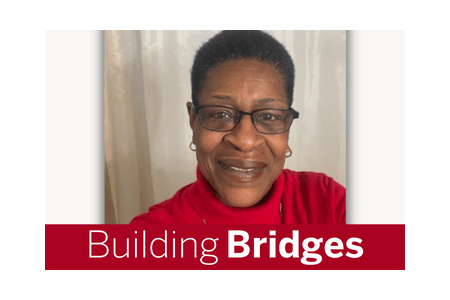Rather than being strangers who arrive in communities, conduct research and leave—the IADRC is forming a partnership with local community centers to better sustain its relationship with older adults throughout Indianapolis, especially those who have been left on the sidelines of research.
Epperson helps organize monthly IADRC events where older adults most impacted by Alzheimer’s disease or other types of dementia can stay informed. Occurring at locations like the John Boner Neighborhood Centers, these events focus on topics ranging from medications and heart health to knowing the difference between Alzheimer’s and dementia. Additionally, transportation and food are provided to help ensure equitable access.
“People are eager to attend these events,” Epperson said. “Knowledge is powerful and can often be the difference between life and death. The knowledge people are gaining by attending these events is empowering their lives.”
Epperson’s work instills Dr. King’s vision by creating sustainable change and building pathways for Black and African American folks throughout Indianapolis to access knowledge. This work shows the community that the IADRC is not just a building downtown but can help connect them with more knowledge about their own health. Recently, the IADRC increased its research participation among Black and African American individuals to more than 20 percent. Not only is this a requirement by the National Institutes of Health (NIH), but it’s crucial in helping fill the gap in research on why older Black adults are twice as likely as their white counterparts to develop Alzheimer’s or other types of dementia.
In fact, Epperson and other IADRC experts learned from a recent study that obstacles, like a lack of transportation, knowledge, or understanding of terminology, procedure, and medications, can prevent Black individuals from participating in Alzheimer’s disease research studies. The monthly and other annual events organized by the IADRC are helping to alleviate those obstacles moving forward.
“My hope is to help gently guide my community, my peers, in the future by making a difference,” Epperson said. “That’s the bridge I’m building; a bridge towards health.”
Now more than ever, it is important to ensure that Black and African American folks are involved in the future of Alzheimer’s research. Epperson’s work has helped transform the way the IADRC engages with the community. Her efforts and spirit not only echo the work of Dr. King but shine a light on the importance of connection and how it can alter the way we approach health care.
“I am extremely honored to be receiving such an important award as the Building Bridges,” Epperson said. “I am extremely grateful for the recognition I have received for the work I am doing in bridging the gap between the IU School of Medicine and the Black and African American community. I am confident that we will reduce the health disparity in the number of Blacks and African Americans predicted to get dementia, and I would also like to acknowledge all the other nominees for this award.”
Learn more about Alzheimer’s outreach throughout Indiana.
